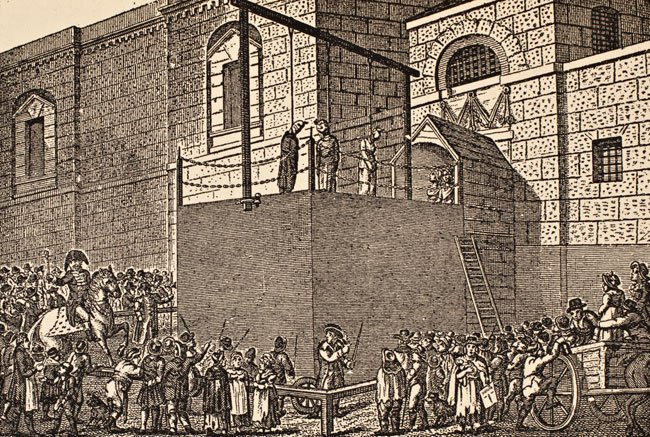James Pratt and John Smith faced execution. It was the last hanging for homosexual acts in England in 1835.

James Pratt, 30, and John Smith, 40, faced death in what was the last execution for homosexual acts in English history. Three months earlier, on August 31, Pratt had said farewell to his family in Deptford, Greenwich.
Pratt met Smith at 45 George Street, now Dolben Street, a lodging house near Blackfriars Road. William Bonill, a stout, 68-year-old laborer with silver hair and a large chin, invited them there; he was five feet five inches tall.
George Berkshire, Bonill’s landlord, grew suspicious because Bonill often brought men to his flat. Berkshire went into a stable loft and removed a tile for a clear view overlooking Bonill’s window. Berkshire told his wife Jane what he saw: Pratt sat on Bonill’s knees, then on Smith’s.
Jane Berkshire peeked through the keyhole and saw the men in sexual acts. The landlords told the authorities. Pratt and Smith was convicted at the Old Bailey and sentenced to hang; Bonnell was also convicted for aiding the crime, receiving 14 years transportation.
They appeared separately for sentencing to prevent “contamination” of others, and the pair seemed “considerably affected,” “leaving the dock in tears.” They stayed separate in Newgate Prison while waiting for execution.
Smith wrote William a letter on November 25, two days before hanging, saying, “The grave will soon close over me,” and added, “My name entirely forgotten,” signing, “Your Lost Friend, John Smith.” Smith and Pratt were hanged, with a large crowd watching outside.
Reports say the men seemed “very weak,” and were “carried from their cell rooms,” with Pratt’s “groans resounded through the prison.” The crowd received them with groans, hissing as preparations went on, and “the bolt was drawn,” one report stated, “The culprits ceased to exist.”
Bonnell’s name appears in a letter authorizing transport of male convicts on the ship Asia, which sailed February 21, 1836, to Van Diemen’s Land, Australia. On arrival, Bonnell pulled down the carpenter shop roof, leading to 24 hours solitary confinement. He died April 29, 1841, at New Norfolk Hospital, built for the mentally ill.
Death for sodomy wasn’t abolished in 1835, and men kept getting that death sentence, but it was changed to life transportation. In 1861, executions stopped, and then, the felony was abolished. Pratt and Smith’s case became “the last hanging,” but did not receive focus then.
The Alan Turing Law pardoned them in 2017, pardoning those convicted of homosexuality. The street was renamed Dolben Street in 1911 where Mary Wollstonecraft lived from 1788–1791. A Blue Plaque marks the location.
Southwark Liberal Democrats want a memorial to honor Pratt and Smith for LGBTQ+ History Month.